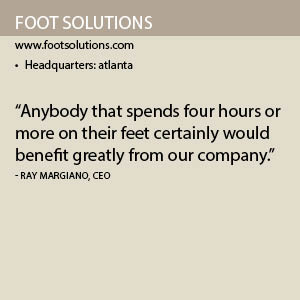Foot Solutions: Putting Your Best Foot Forward with Customized Care and Expansion Initiatives
In addition to serving older adults, Foot Solutions’ clientele includes people who have minor foot problems or work in occupations that require extensive standing or walking, such as nurses, production line or construction workers, waitresses and chefs. “Anybody that spends four hours or more on their feet certainly would benefit greatly from our company,” Margiano says.
Margiano’s business experience extends back to 1985, when he founded HeelQuik, a shoe repair franchise. He transitioned to the Foot Solutions concept in 2000.
Customized Services
Foot Solutions operates 120 stores in 14 countries, all but two of which are franchise locations. Each store offers a free foot analysis, which includes the use of computerized scanning technology to determine the customer’s problem. Recommendations for new footwear or customized orthotic inserts are then made.
All locations have at least one certified pedorthist on staff, along with certified shoe fitters. Pedorthists review each of the scans and make adjustments based on customer needs and problems. The computer scans are used to design and manufacture a custom insert that fits into the shoe the person will wear.
The company operates its own laboratory in Atlanta, where it manufactures the custom orthotics it sells. In addition to its custom products, Foot Solutions also manufactures shoe inserts used by athletes and professionals. “The lab is really the cornerstone of our business,” Margiano says. “Having our own laboratory is critical to our ability to support our stores and other programs.”
Foot Solutions’ staff pedorthists are trained at the company’s own school, the Academy of Pedorthic Science. The academy, which is affiliated with Kennesaw State University’s College of Continuing and Professional Education, also provides courses to doctors, therapists and other specialists. “[The academy] gives us added revenue as well as greater credibility in our field,” he adds.
Custom orthotics typically range in price from $125 to $400. The average sale at one of the company’s stores is $200. Shoes make up roughly 60 percent of Foot Solutions’ sales, and orthotics/inserts are roughly 30 percent of overall sales. The remaining 10 percent includes socks and other retail products, Margiano says.
Licensing Efforts
The company recently took another step toward increasing its profile. Foot Solutions’ new licensing program will bring its services and name to outside locations including doctors’ offices and drug stores. The program involves placing a branded Foot Solutions kiosk offering the company’s services and products within an existing business.
Employees and the staff of licensee businesses are trained in how to use Foot Solutions’ technology. In addition, Foot Solutions provides training and business analysis. “We can give independent retailers, small chains and medical offices additional tools and the ability to provide services they currently cannot,” Margiano says. “We want to help them add to their business mix and bottom line.”
There are six licensed Foot Solutions kiosks in place, with 10 others planned to open soon. Margiano expects to expand licensing to 30 total locations before the end of the year.
Foot Solutions also recently rolled out a new store concept. The 1,800-square-foot concept has an upscale look and emphasizes the fashionable element of the company’s products, catering to the company’s core female customer base. Three existing stores have the new look, and all future franchise locations will incorporate the design, Margiano says.
Growth Opportunities
The company within the past few years has seen significant interest in new businesses. “We were in survival mode during the Great Recession, but once we got back into a settled retail environment, we’ve done very well,” Margiano says. “We learned how to adjust our model rapidly.”
Foot Solutions continues to reach out to prospective customers. The company recently shifted its marketing strategy online through web advertising and social media, which has increased its retail penetration while reducing marketing costs.
Margiano anticipates adding 12 new franchise locations by the end of the year. Many of the company’s new franchisees are age 40 to 50, a significant shift from its origins, when most owners were age 55 and up.
The average total franchisee investment in a Foot Solutions location is $200,000. Locations have an average gross margin of 60 percent and a 70 percent base customer retention rate.
“Our return on investment to franchisees is very attractive. We’re ideal for people looking for a niche opportunity in a cottage industry with no major competitors,” Margiano says. “This is a business that helps people feel better and eliminates issues they were dealing with. Most of our customers thank us for what we’ve done for them.”
